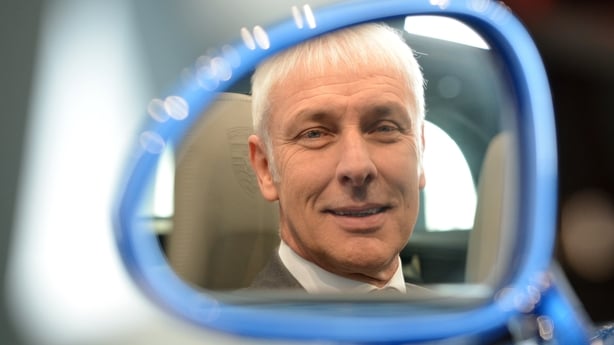The Volkswagen Group is to recall almost 80,000 cars sold in Ireland following revelations of emissions tests cheating.
In a statement this evening, the company said individual customers will be contacted about what it called its "action plan to correct the emissions characteristics of certain diesel vehicles".
The recall will involve 34,387 Volkswagen passenger cars, 16,485 Audi cars, 4,365 SEAT cars, and 16,004 Skoda cars.
The recall will also include 8,107 commercial vehicles sold under the Volkswagen brand. In a further clarification, the company said an additional 30,000 cars may be recalled.
These are understood to be imported second-hand cars. The company is to set up an online service for customers to check if their car will be affected.
The company says the process of correcting the emissions will begin shortly, but said that all vehicles are "technically safe and road-worthy".
Earlier, the company said it had suspended the sale of around 4,000 vehicles in the UK due to software at the centre of an emissions scandal, the German carmaker's British unit said.
The suspension applies to vehicles held in stock that could feature the software, and affects around 3% of the stock in Britain, a spokesman said.
The company also said it will need at least several months to complete an investigation into the rigging of emissions tests on diesel vehicles, pushing back an extraordinary general meeting scheduled for next month.
The executive committee of the board said management would nonetheless inform the public next week of solutions found for the problems it is facing.
It also said it would propose naming Frank Witter, the head of VW's financing arm, as its new finance chief, confirming an earlier Reuters report.
It has been reported that Volkswagen is looking at ways to cut costs and boost cash flow and could sell more shares if the price of clearing up the scandal puts its credit rating at risk.
The German carmaker's supervisory board has discussed ways of strengthening its finances, but has not talked about selling assets or brands. This is according to two sources close to the board.
One said raising money by selling shares would become likely if the cash costs of the scandal exceeded a "critical level", without elaborating. Volkswagen declined to comment.
Europe's largest carmaker has admitted cheating in diesel emissions tests in the US and Germany's transport minister says it also manipulated them in Europe, where Volkswagen sells about 40% of its vehicles.
The biggest crisis in the company's 78-year history has seen its shares plunge more than a third in value and forced out long-time chief executive Martin Winterkorn.
Volkswagen, which is already implementing a €5 billion cost savings programme at its VW brand, imposed a hiring freeze at its financing arm and cut a shift at a German engine factory on Tuesday, in a sign it is bracing for a blow to its business.
France and Australia have joined other countries in launching investigations into Volkswagen, while an Italian consumer group has filed a class action lawsuit, accusing Volkswagen of deceiving car owners and potentially harming the environment.
A Texas county has also sued the company, accusing it of violating state environmental laws and seeking up to $25,000 in damages per violation per day.
New chief executive Matthias Mueller, a company veteran appointed on Friday to replace Winterkorn, is under huge pressure to get to grips with the scandal.

The company has hired US law firm Jones Day to lead an external investigation, a source close to the matter has said. The external probe is a key demand of some investors who have been critical of the board's decision to continue appointing insiders to top jobs in the wake of the crisis.
Some analysts have suggested the company might sell off its trucks business or some brands such as Bugatti, Ducati and Lamborghini to raise money.
It has also sent shockwaves through the global car industry and the German establishment, which has for years held up Volkswagen as a model of the country's engineering prowess.
The company has set aside €6.5 billion to help cover the costs of the scandal, but some analysts think the final bill could be much higher.
Volkswagen has said it will refit up to 11 million diesel vehicles containing software capable of cheating emission tests.
Sources said the board was worried that, without boosting its finances, its credit ratings might be downgraded, leading to higher borrowing costs.
Moody's, S&P and Fitch have all put negative outlooks on their credit ratings for Volkswagen, meaning they see a risk they might have to be cut.
Analysts said that VW has a fairly robust balance sheet, while it also has a very conservative approach to financing and its credit rating.
They noted that Volkswagen had €17.6bn of cash at the end of the second quarter, plus €15bn of marketable securities. But they also said it had suggested in the past that it needed a minimum of €10bn in net cash to run the business.
At an auto industry conference in Berlin today, the mood was sombre, with the newly-appointed sales chief of Volkswagen's namesake brand and its head of future research pulling out.
"This scandal is causing damage to the entire German car industry and to German engineering," Helmut Kluger, publisher of trade magazine Automobilwoche, told delegates.
"There is no excuse whatsoever for the VW cheat. Toyota will remain the world's largest carmaker in the foreseeable future, that's clear now," he added, referring to Volkswagen's goal - achieved in the first half of this year - to overtake Japan's Toyota to become the world's biggest selling carmaker.
There is no evidence to date that other carmakers have used the same "cheat" software as Volkswagen. But the industry fears more costly regulations and a hit to sales of diesel vehicles.

